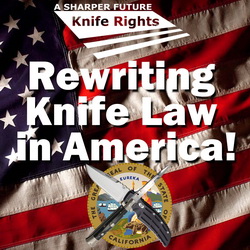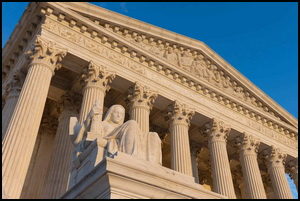
The very first hearing on one of our post-Bruen lawsuits challenging a knife ban on Second Amendment grounds was held yesterday before District Court Judge James E. Simmons, Jr., in San Diego. The lawsuit challenges California’s ban on switchblade (automatic) knives with a blade 2-inches and greater.
The court had clearly given significant thought to the voluminous filings in the case. The state continued to hammer their position that switchblades were not not arms under the plain text of the Second Amendment because they were “not commonly used for self-defense.”
For our part, our attorney explained how the “used for self-defense” argument has no basis in the “plain text of the Second Amendment,” despite a few courts inventing it out of whole cloth. It appeared that the court picked up on the inconsistency of the state’s arguments when they tried to use a broad category of so-called “analogous” weapons restrictions to historically justify their ban in the second prong of the two-step process for determining constitutionality, while narrowly constricting their concern just to switchblades in the plain text analysis. Either the switchblade should be considered as just another knife that is clearly covered by the Second Amendment and to which bans on them are not historically justified, or it is some oddball weapon that is both not common and uniquely dangerous.
It was telling, perhaps, that the court asked the state if it was okay to ban possession of any particular pistol while allowing possession of all others. The state really had no rational answer to that question.
Knife Rights’ attorney John Dillon said, “it is clear under the binding authority of the Supreme Court that knives, including switchblades, are arms under the Second Amendment’s plain text. That being said, it was clear the court agreed with Plaintiffs that the historical record offered by the state was significantly lacking. We hope for a favorable decision which faithfully applies the standards set forth by the Supreme Court.”
What the district courts decides will not change the course of the litigation since it is certain to be appealed. This is just the first step in a long process. However, it would be nice to go forward with a win. Stay tuned!
Please support Knife Rights’ lawsuits with a tax-deductible donation to the Knife Rights Foundation at: www.KnifeRights.org/donate (select Knife Rights Foundation)
BACKGROUND
 Broadly, in NYSRPA v. Bruen the Supreme Court held that the Second Amendment includes the right to be armed for self-defense at home and in public. This right can only be limited to the extent that there is a historical tradition of limitation in the period immediately prior to and around the time of the Constitution’s framing in the late 18th century up to the late 19th century. A few restrictions on knives of various sorts that are outliers from that time period do not count. Restrictions imposed later, including on switchblades in the 1950s, don’t count. Possession and carry of knives survives this constitutional test.
Broadly, in NYSRPA v. Bruen the Supreme Court held that the Second Amendment includes the right to be armed for self-defense at home and in public. This right can only be limited to the extent that there is a historical tradition of limitation in the period immediately prior to and around the time of the Constitution’s framing in the late 18th century up to the late 19th century. A few restrictions on knives of various sorts that are outliers from that time period do not count. Restrictions imposed later, including on switchblades in the 1950s, don’t count. Possession and carry of knives survives this constitutional test.
Bruen upheld restrictions on weapons such as machine guns that are deemed by the court to be both “dangerous and unusual.” A weapon that is either not “dangerous” or not “unusual” cannot be prohibited. Automatically opening (“switchblade”) knives and other knife designs and opening mechanisms are neither “unusual,” being legal and common in most places today, nor any more “dangerous” than other non-prohibited knives or weapons. Knife bans existent today do not pass constitutional muster after Bruen.
Bruen also emphasized emphatically from the court’s prior Second Amendment McDonald decision that “the constitutional right to bear arms in public for self-defense is not a second-class right, subject to an entirely different body of rules than the other Bill of Rights guarantees.” Second Amendment decisions by courts must be made on the basis of strict scrutiny, just as with other rights. Intermediate scrutiny or “interest balancing” can no longer be used to decide Second Amendment cases. As such, the government can no longer defend knife bans because government doesn’t like a particular type of knife, for whatever irrational basis it comes up with.
Knife Rights (www.KnifeRights.org) is America’s grassroots knife owners’ organization; leading the fight to Rewrite Knife Law in America™ and forging a Sharper Future for all Americans™. Knife Rights efforts have resulted in 44 bills enacted repealing knife bans in 27 states and over 175 cities and towns since 2010.


